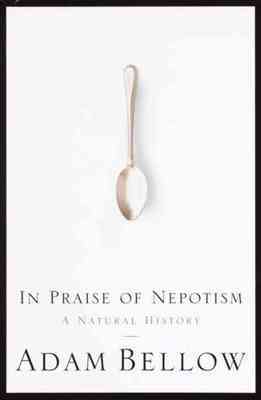约翰-亚当斯开创了共和国家的世袭先例,他公开地提携了他的几个儿子。 警察和消防员等职业常常也是代代相传的。 成败之间话裙带——亚当-贝娄谈美国“太子党”
译自2003年8月25日美国《标准周刊》(第8卷47期)
作者 诺米-艾墨瑞(Noemie Emery)
译者 郑小峰(芝加哥)(zheng_xiaofeng@hotmail.com)
校者 田方萌(北京)(tianfm@sina.com)
《说说裙带关系的好话》(In Praise ofNepotism),亚当-贝娄著,Doubleday出版社,576页,30美元
当代美国社会的裙带关系可能在2001年11月20日达到了顶峰。当天,美国司法部大楼被冠以"罗伯特-F-肯尼迪"(Robert-F-Kennedy,见注1)的大名。肯尼迪生前的朋友、亲戚和现任总统都出席了命名仪式。
这个仪式称得上是美国政坛特权家族的盛会。到场的嘉宾包括下列诸位。美国总统乔治-W-布什(George-W-Bush),他是前总统乔治-H-W-布什(注2)之子,佛罗里达州州长吉布-布什(JebBush)之兄;参议员爱德华-M-肯尼迪(Edward-M-Kennedy),他是罗伯特-肯尼迪和约翰-肯尼迪(注3)之弟,罗得岛众议员帕特里克-肯尼迪(PatrickKennedy)之父;还有罗伯特-肯尼迪的众多子女,包括一度被认为是政界高位热门人选的前众议员约瑟夫-P-肯尼迪II(Joseph PKennedy II),和时任马里兰州副州长,并很有希望入驻州长官邸的凯瑟琳-肯尼迪-汤珊德( Kathleen KennedyTownsend,注4)。约瑟夫-肯尼迪对嘉宾们朗声引述了他父亲的原话,讲罗伯特-肯尼迪如何能在35岁之年就升任司法部长:"我努力工作,雄心勃勃,孜孜不倦地学习,全身心地投入,这时我哥哥当选了总统。"
大家都笑了,这个笑话让他们联想到一项事实,那就是如果没有和两位前总统——乔治-H-W-布什和约翰-肯尼迪——攀上亲戚,他们所有人都不可能呆在那在地方。而老布什和肯尼迪这两位前总统也都拥有尊贵的父亲,他们的老爸或是非常富有,或与百万富翁过丛甚密,而且都担任政府要职。小布什在总统竞选中险胜小艾伯特-戈尔(AlbertGoreJr.),后者的父亲(与儿子同名——译者注)曾是杰出的田纳西州参议员,他从出生起就致力于把小戈尔培养成总统,并让他继承了自己在参众两院的席位。小布什一朝权在手,就开始把一些可以任命的职位和差事分配给了布什拓展了的政治家族中的成员:副总统理查德-切尼的女儿伊丽莎白-切尼(ElizabethCheney)被任命为国务院副助理秘书,国务卿柯林-鲍威尔的儿子麦克尔-鲍威尔(MichaelPowell)则就任联邦通讯委员会(FCC)主席。
这种好运并不局限于布什和肯尼迪家族。在2002年,伊丽莎白-多尔(Elizabeth Dole)也和希拉利-克林顿(HillaryClinton)一样成为参议员,她们的芳名早已在其夫竞选总统时就已家喻户晓(注5)。在国会中,除了多尔夫人和克林顿夫人,还有一大堆知名政界人物的夫人、遗孀、子女和兄弟姐妹,比如说埃文-贝(EvanBayh,参议员之子),玛丽-兰君尔(Mary Landrieu,新奥尔良市市长之女),约翰-桑努努(JohnSununu,前新汉普郡参议员之子),众议院少数党领袖南希-派洛斯(NancyPelosi,其父连任五届巴尔的摩众议员),和正平步青云的赫诺德-福特(Harold FordJr),他已经接了父亲在众议院的班。
如果说政治都是相对而言的——或者政界的每个人都是某某人的亲戚(“相对”和“亲戚”在英语中均为"relative",作者在此用了双关语——译者注)——其他行当的情况也不例外:在戏剧界,瑞德戈里夫(Redgrave)家族名角辈出,现在已经传到了第三代;在出版界,《纽约时报》和《华盛顿邮报》的经营者都是创始人的孙辈;警察和消防员等职业常常也是代代相传的。
当然,这些裙带关系对亚当-贝娄来说都不是什么新鲜事,他本人就是小说家索尔-贝娄(SaulBellow)之子。还有很多作家的孩子追随父亲开始了自己的写作生涯,即便他们不是全去爬了格子。贝娄认为父亲为他打开了创作之门(如果不是硬把他拉到作家队伍里),而且一点也不觉得这种子承父业的事情有什么不妥。事实上,他还以此为主题写了整整一本书(《说说裙带关系的好处》)。
"裙带关系"一词源于拉丁语"nepote",它在14世纪被人们创造出来,用于描述将私生子安排到文职高位的通例。数百年来裙带关系盛行于世袭等级社会,但它在美国遇到了阻力,因为它与人人平等、共和政府,以及崇拜自我创业等价值观相抵触。
使裙带关系与这些价值观和睦共处从来都不大容易。贝娄写道:"在建国初期,美国人对裙带关系的态度是很令人费解的。"托马斯-杰弗逊(ThomasJefferson,注6)生于豪门望族,他的家族在合众国等级最为分明的州中势力最为庞大,可杰弗逊却为发展有关群众组织和准民粹主义竞选活动(quasi-populistcampaigning)的政治艺术作出了自己的贡献。他理所当然地继承了自己祖上的社会地位,不像乔治-华盛顿那样诞生于一位小农场主的第二次婚姻,从而不得不借助拓展家族成员的亲戚网络而获得晋升的机会。
约翰-亚当斯(注7)开创了共和国家的世袭先例,他公开地提携了他的几个儿子。有两个儿子没能承受住那种紧张的生活,但长子约翰-昆西-亚当斯(JohnQuincyAdam,注8)"接受了命运的安排",从孩提时就开始面对巨大的压力,此后再也没有摆脱它。约翰11岁时作为父亲的秘书与他一道前往法国;14岁作为美国使者的秘书(没有父亲陪同)远赴俄国;15和16岁时,他作为美国停战(注9)代表团的秘书被派往海牙和巴黎;1786年,老亚当斯出任美国驻英国圣詹姆斯王朝(Courtof St.James)的大使后,他再一次成为父亲的秘书。1794年,约翰27岁时被华盛顿总统委任为美国驻荷兰大使——他的仕途终于真正开始了,这时他父亲已身为副总统。30年过去了,在历任国务卿和驻俄、驻英大使之后,昆西-亚当斯终于追随父亲,在1824年成为美国历史上第6位总统。
但是很不幸,这位"子继父位"的第一人遭遇的对手乃是安德鲁-杰克逊(,注11)——美国政治史上第一位出身贫寒而成功崛起的人物。杰克逊攻击了亚当斯的家庭出身:"亚当斯被描述为彻底脱离群众的人,他从未诚实地工作过,还鄙视老百姓。……他的家庭被讽刺为'布瑞退议院'(theHouse ofBraintree,布瑞退是亚当斯家庭所在的地方,House一语双关——译者注),他父亲被讽刺为'约翰一世皇帝'(King Johnthe First)。"杰克逊首创的这种攻击对手显赫出身的做法在以后的历史中经久不衰。
西奥多-罗斯福(TheodoreRoosevelt,注11)年仅23岁就被选为纽约州议会最年轻的议员,这完全是靠他父亲——一位纽约著名慈善家——的声望。纽约人对西奥多的父亲几乎到了顶礼膜拜的地步。《纽约邮报》评论道:"罗斯福先生以他的血统完全有资格获得纽约选民的信任与期望,因为他父亲在世时每一天都在为公众提供着最有力的帮助。"后来,泰迪(Teddy,西奥多-罗斯福的昵称——译者注)的大名又为弗兰克林-罗斯福(FranklinRoosevelt,注12)的政治生涯提供了火箭燃料般的助力,而后者正是前者的五代堂弟(既两者高祖为同一人,实为远亲——译者注)。弗兰克林-罗斯福以这位前总统为榜样,得到了他的帮助,娶了他的侄女,还按照西奥多的人生轨迹规划了自己的职业生涯。贝娄引用了斯蒂芬-海斯(StephenHess,注14)的评价:"公众认为弗兰克林-罗斯福是西奥多-罗斯福总统的儿子或侄子,弗兰克林根本没有试图纠正这种错误印象。"贝娄认为弗兰克林-罗斯福是靠与泰迪-罗斯福的裙带联系(coattailconnection)才在1920年被指定为副总统候选人的,这段经历是弗兰克林政治生涯中的里程碑。当时他经常听到人们对他喊:"我投了你父亲一票!"
当弗兰克林-罗斯福竞选总统时,他的支持者中有一位名为约瑟夫-P-肯尼迪(Joseph PKennedy)的金融家。约瑟夫有九个孩子,他毕生都在为他们的前途奔忙,以致于将裙带关系发展到了前所未有的惊人程度。怀着4个儿子都入步入政界的梦想,约瑟夫花了29年时间培养长子小约瑟夫-肯尼迪(JosephKennedy,Jr.,注14),希望他以后能成为美国总统。接着他又坚持让次子约翰继承其兄长未尽的事业。约翰-肯尼迪在他担任参议员和总统期间与另外两位参议员结识并共事过,一位是来自康涅迪格州的布莱斯考特-布什(PrescottBush),另一位是来自田纳西州的阿尔伯特-戈尔(AlbertGore)。1962年布莱斯考特-布什退休时,他的次子乔治-H-W-布什正准备竞选德克萨斯州的议席,并梦想有一天能成为总统。
同时,戈儿也抱有竞选总统的雄心,不仅为他自己,也为孩子。从儿子小艾伯特出生开始,戈儿就把他当作未来的总统培养。学校的同学们给小艾伯特取了个绰号叫"艾尔王子"(PrinceAl,Al系艾伯特之昵称——译者注)。小艾伯特出生的消息上了田纳西州当地报纸的头版;6岁时他已经作为培训中的政治家而受到欢迎;28岁时他继承了老戈儿在众议院的席位,并在36岁之年一跃成为参议员。不到40岁,小艾伯特就应父亲的要求参加了一次总统竞选。4年后,作为副总统候选人,他与比尔-克林顿一道击败了竞选连任的乔治-H-W-布什。又过了8年,如他父亲终生所愿,小艾伯特终于开始竞选美国总统。在那场被称为王侯之争(abattle of dynasts)的选战中,他输给了老布什的长子乔治(即小布什——译者注)。
是不是名门之后总能成功呢?不见得。出乎中学和大学时代熟人们的意料,乔治-W-布什和约翰-肯尼迪早年都被看作是各自家门中的浪荡公子(cut-ups,原意为胡闹的人——译者注),两人后来却具备了熟练的政治手腕和真正的领袖素质。但艾尔-戈尔即使在从政二三十年后仍未发挥出这种这种本能。凯瑟琳-格雷厄姆(KatharineGraham,注15)拯救了《华盛顿邮报》;但在路易斯维尔(Louisville),丁汉姆(Bingham)家族的媒体王国却被其继承人分割为碎片。至于西奥多-罗斯福的四个儿子,还有弗兰克林-罗斯福和埃莉诺-罗斯福(Eleanor)所生的四个儿子,他们中间没有哪位在政界大有作为。
约瑟夫-P-肯尼迪在世的孙子和孙女共有26人。即便拥有泉涌般的钱财、好莱坞明星的光环、媒体不断的关注以及金钱和爱情所能买到的最佳顾问,他们中也没有哪一位能够成为杰出的政治人物。2000年(因艾尔-戈尔)和2002年,由于任用了两位靠家族背景开始起职业生涯的名门子弟,民主党在选举中遭受了重大挫折。在更公开的场合进行激烈的竞选中,这两位候选人根本不具有竞争力,因为那里家族背景的因素被大大削弱了:马里兰州的民主党人为自己的决定后悔不已,他们不该迫使巴尔的摩市市长退出州长预选,而为凯瑟琳-肯尼迪-汤山德(KathleenKennedy Townsend)让出位子。写作本文的时候,肯尼迪家族第三代中唯一一位身居要职的人是一个表现平平的国会议员,当年为了首次当选罗得岛州议员,他平均为每张选票花了73美元。
这也许说明裙带关系和价值理念之间的冲突并不像看上去那么剧烈。西奥多-罗斯福靠他老爸起家,但后来他本人也建立了活跃有力的政治形象。弗兰克林-罗斯福利用他表哥跃入龙门,但很快也树立了自己独特的风格。政坛上一度风光的肯尼迪三兄弟明显各不相同,他们不仅有别于父亲,彼此之间也各具风采,其政治追求、个人风格以及支持者都不一样。作为政治家,乔治-W-布什也不同于他的父亲和祖父。和约翰-肯尼迪一样,他反对那些他认为是父亲做错的地方。正如贝娄指出的,泰德-肯尼迪(爱德华-肯尼迪的昵称——译者注)凭借他的姓氏迈进参议院的大门,但他依靠自己的才能在那里呆了40年,并成为举足轻重的人物。相比之下,肯尼迪家族的下一代由于没能扮演富有魅力的角色而纷纷落马。要想成功,名门之后必须脱离家族的背景,重新界定自己的血统。否则,他们看来注定要失败的。
当然,失败和成功是硬币的正反面,世家子弟其实更易于失败。出于好心的豪门家长有时施加给儿子们难以承受的压力,直到他们崩溃(如约翰-亚当斯和约翰-昆西-亚当斯的儿子们);有时为儿女们选择了错误的职业(如小艾伯特-戈尔);或者让他们放任自流于超出其权力的荣耀和诱惑之中。弗兰克林-罗斯福夫妇就"很少管教"(underinvolved)子女,没有给他们足够的关注和约束。贝娄告诉读者,罗斯福的儿子们"就是那种你能预见到的,被宠坏的机会主义者,他们毫不犹豫地利用家族名声谋取私利。"罗伯特-R-肯尼迪在1968年被刺杀后,他的很多幼子在或多或少缺乏成年人看管的环境下成长起来,并沉迷于名利场中。在多次毒瘾和事故之后,其中一些人现在回归了有序的生活,另一些却离开了这个世界。
亚当-贝娄说得对,裙带关系的某些方面是值得称赞的。但是,看看这些世家子弟,我们也得担心它的另外一些方面。
注1:罗伯特-F-肯尼迪,1961-1964任美国司法部长,1964-1968任参议员,于1968年竞选总统期间遭暗杀
注2:乔治-H-W-布什,1989-1993任美国总统
注3:约翰-F-肯尼迪,1961-1963间任美国总统,于1963年遭暗杀
注4:凯瑟琳-肯尼迪-汤珊德,美国妇女结婚后常常会冠夫姓,把娘家姓作为中间名
注5:伊丽莎白-多尔的丈夫鲍勃-多尔(BobDole)自1962年起大部分时间一直任国会议员,他于1996年在与克林顿的总统竞选中败北。希拉利-克林顿的丈夫比尔-克林顿在1993-2001年间任美国总统,她本人于2000年当选参议员至今
注6:托马斯-杰菲逊,美国第3位总统,1801-1809在职
注7:约翰-亚当斯,美国第2位总统,1797-1801在职
注8:约翰-昆西-亚当斯,生于1767年,1825-1829年间任美国总统
注9:指美国独立战争胜利后的美英谈判
注10:安德鲁-杰克逊,1829-1837年任美国总统
注11:西罗多-罗斯福,1901-1909间任美国总统

注12:弗兰克林-罗斯福,1933-1945间任美国总统
注13:斯蒂芬-海斯,《总统和任期》(Presidents & thePresidency)一书的作者
注14:小约瑟夫-肯尼迪,二战中阵亡,终年29岁
注15:凯瑟琳-格雷厄姆,华盛顿邮报的继承人,2001年病逝
附:原文及网址
http://www.weeklystandard.com/check.asp?idArticle=3012&r=cwuru
Two Cheers for Nepotism
Adam Bellow on fathers and sons.
by Noemie Emery
08/25/2003, Volume 008, Issue 47
In Praise of Nepotism
by Adam Bellow
Doubleday, 576 pp., $30
THE HIGH-WATER MARK of nepotism in modern America may have occurredon November 20, 2001, when the building that houses the Departmentof Justice was renamed in honor of Robert F. Kennedy before a crowdthat included his friends and relations and the president of theUnited States.
It was a festival of the genealogically privileged. Present wereGeorge W. Bush, the son of George H.W. Bush and brother of GovernorJeb Bush of Florida; Senator Edward M. Kennedy, brother of Robertand John, and father of congressman Patrick Kennedy of RhodeIsland; and Robert F. Kennedy's numerous children, including formercongressman Joseph P. Kennedy II, once a hot prospect for higheroffice, and Kathleen Kennedy Townsend, then in her second term aslieutenant governor of Maryland and considered a shoo-in to accedeto the governor's mansion. All listened as Joseph Kennedy II readaloud the account that his father once gave of how he managed torise at thirty-five to the station of attorney general: "I workedhard, I was ambitious, I studied, I applied myself, and then mybrother was elected president."
All laughed, for the joke that connected everyone there was thefact that none of them would have been in that room if they had notbeen related to two former presidents--George H.W. Bush and JohnKennedy--who themselves had been children of two rich and richlyconnected millionaire fathers who also held high public office. Theyounger Bush had become president when he narrowly defeated AlbertGore Jr., son of a prominent Tennessee senator who had raisedAlbert Jr. from his birth to be president and had bequeathed himhis seats in the House and the Senate. Once installed, Bush beganhanding out choice jobs and assignments to members of the Bushes'extended political family: Elizabeth Cheney, daughter of VicePresident Richard Cheney, is a deputy assistant secretary in theState Department, while Michael Powell, son of Secretary of StateColin Powell, is chairman of the FCC.
This good luck was not confined to the Bushes and Kennedys. In2002, Elizabeth Dole joined Hillary Clinton in the United StatesSenate; they had become household names when their husbands wererunning for president. Once in Congress, Mesdames Dole and Clintonjoined a rich assortment of wives, widows, children, and siblingsof other well-known political people, including Evan Bayh (son of asenator), Mary Landrieu (daughter of a New Orleans mayor), JohnSununu (son of a former New Hampshire governor), House minorityleader Nancy Pelosi (daughter of a five-term Baltimorecongressman), and the up-and-coming Harold Ford Jr., who took hisfather's old seat in the House.
If everything in politics seems to be relative--or everyone inpolitics somebody's relative--it also holds true in otherprofessions: in the theater, where the Redgrave family is in itsthird generation of stardom; in the press, where the New York Timesand the Washington Post are now being run by the grandsons ofpublishers, and in police and fire departments, where membershipalso runs in the family.
Of course, none of this is news to Adam Bellow, son of the novelistSaul, and one of a number of children of writers who have followedtheir parents into the writing profession, if not always in thesame field. Bellow, who credits his father's name with openingdoors for him (if not for keeping him on the right side of them),does not find this troubling. In fact, he's written an entire book,"In Praise of Nepotism," about the phenomenon.
THE WORD "NEPOTISM," from the Latin word nepote, was coined in thefourteenth century to describe the custom of appointing bastards tohigh civil posts. For centuries, it flourished as the handmaiden ofclass systems based on inheritance, meeting resistance in America,where it ran head-on into the competing values of egalitarianism,republican government, and worship of the self-made man.
Reconciling nepotism with those values has always been difficult."The founding period," Bellow writes, "was one in which theAmerican attitude toward nepotism took shape as something deeplyconfused." Thus Thomas Jefferson, son of the most powerful familyin the most class-driven state in the Union, helped to develop thepolitical arts of mass organization and quasi-populist campaigning.He inherited his class standing as a matter of course, unlikeGeorge Washington, son of the second marriage of a minor planter,who had to depend on the favors of a complex web of extended-familymembers to help his ascent.
It was John Adams who broke new ground as a republican dynast,openly raising his sons to be great. Two cracked under the strain,but the eldest, John Quincy, "accepted his fate," and as a childwould enter a cauldron of pressure from which he never emerged. Atage eleven, he went with his father to France as his secretary; atfourteen he went to Russia (minus his father) as secretary to theAmerican legate; at fifteen and sixteen he was secretary toAmerican peace delegations at The Hague and Paris; and in 1786 hewent to London as his father's secretary when the elder Adamsbecame ambassador to the Court of St. James. In 1794 PresidentWashington appointed his vice president's son ambassador to theNetherlands at age twenty-seven, and his official career hadstarted in earnest: Thirty years later, having been secretary ofstate and ambassador to Russia and Britain, he did indeed followhis father, becoming the sixth president in 1824.
But this First Nepot had the misfortune to be opposed by the firstgreat self-made man in American political history, Andrew Jackson,who turned Adams's background against him in what would emerge asthe time-honored fashion: "Adams was portrayed as hopelessly out oftouch, a man who never worked an honest day in his life, and whodespised the common people. . . . His family was mockingly referredto as 'the House of Braintree,' and his father as 'King John theFirst.'"
When Theodore Roosevelt became at twenty-three the youngest memberof the New York Assembly in 1882, he was elected wholly on thereputation of his father, a well-known philanthropist, who had beenall but worshipped in New York. "Mr. Roosevelt has hereditaryclaims to the confidence and hopefulness of the voters of thiscity," the New York Post advised readers, "for his father was inhis day one of the most useful and public-spirited of men." Teddy'sRoosevelt name in turn became the booster-rocket for his fifthcousin Franklin, who adopted the former president as his model andpatron, married his niece, and mapped out a career path that inevery particular mirrored the one taken by Theodore. Bellow citesStephen Hess's comment: "The young candidate didn't bother tocorrect any mistaken impression that he was a son or nephew of theRoosevelt president." He credits the big break of Franklin'scareer--his selection in 1920 to run as vice president--to his"coattail connection" with Teddy. "I voted for your father!" heoften heard people cry.
WHEN FRANKLIN HIMSELF first ran for president, one of his backerswas Joseph P. Kennedy, a financier with nine children who, bymaking his children's advancement the work of his lifetime, liftednepotism to stunning new heights. Dreaming of seeing his four sonsin government, he devoted twenty-nine years to raising his firstson, Joe Jr., to grow up to be president. He insisted his secondson John take his place. As senator and president, John Kennedy hadknown and had worked with two other senators, Prescott Bush ofConnecticut and Albert Gore of Tennessee. In 1962, Prescott Bushretired, but his second son, George Herbert Walker Bush, wasplanning his run for a House seat in Texas and dreaming of becomingpresident himself.
Meanwhile, Gore had presidential ambitions both for himself and hisson, who was raised from his birth as an oncoming president, andwhose nickname at school was "Prince Al." His birth was announcedon the front page of the Tennessee newspapers; at age six, he washailed as a politician in training; at twenty-eight, he took hisfather's old House seat, and then jumped to the Senate at agethirty-six. At just under forty, he ran his first race forpresident, because his father had asked him to do it. Four yearslater, he ran for vice president on Bill Clinton's ticket, and theyousted George H.W. Bush, who was seeking reelection. Eight yearsafter that, he made the run for the presidency his father hadplanned all his life. In what was billed as a battle of dynasts, helost to Bush's eldest son, George.
Does this mean that nepotism is always triumphant? Not quite. Tothe surprise of all who had known them in prep school and college,family cut-ups George W. Bush and John Kennedy turned out to havepolitical skills and real leaderly qualities. But Al Gore neverdeveloped such instincts, despite a quarter century in public life.Katharine Graham saved the Washington Post, but the newspaperempire of the Binghams of Louisville was torn to shreds by theirheirs. Neither the four sons of Theodore Roosevelt nor the foursons of Franklin and Eleanor ever got far in nationalpolitics.
And as for the twenty-six surviving grandchildren of Joseph P.Kennedy, torrents of cash, Hollywood stars, endless publicity, andthe best advisers that love and money can purchase have been unableto create a single distinguished political figure. In 2000 (with AlGore) and in 2002, Democrats were badly burned by two children ofmajor political talents who got their first jobs on the names oftheir families, and proved unequal to tough races in more exposedvenues, where family feeling carried less weight: MarylandDemocrats are ruing the day they forced Baltimore mayor MartinO'Malley out of the gubernatorial primary to make room for KathleenKennedy Townsend. And at this writing, the one member of the thirdKennedy generation now in a major political office is a singlelackluster member of Congress, who won his first seat in the RhodeIsland State Assembly by spending $73 a vote.
What this may suggest is that the tension between nepotism andmerit is not quite as great as it seems. Theodore Roosevelt got hisstart as the son of his father but turned himself into a dynamicand forceful political presence. Franklin Roosevelt at first spunoff from his cousin but quickly established his singular presence.The three Kennedy brothers who had major careers were markedlydifferent, not just from their father, but from one another, withdifferent causes, and styles, and followers. As a politician,George W. Bush is different from both his father and grandfather,and, much as John Kennedy did, defines himself in opposition towhat he perceives as his father's misjudgments. As Bellow pointsout, Ted Kennedy's name put him into the Senate, but forty yearslater his talents have kept him there, and turned him into a figureof consequence. By contrast, the younger Kennedys who were flushedout of office failed to establish compelling personae. To succeed,a dynast has to push off from the family name and in some senseredefine it. If he doesn't, he appears doomed to fail.
Failure, of course, is the flip side of glory, and one to whichdynasts are prone. Well-meaning dynasts have pushed sons till theybroke (the sons of both John and John Quincy Adams); pushed theminto the wrong line of work (Albert Gore Jr.); or set them adriftat a level of fame and temptation that exceeded their powers tocope. Franklin and Eleanor Roosevelt were "underinvolved" withtheir children and gave them scant attention and discipline. Thesons they got "were just the kind you would expect," Bellow informsus, "spoiled opportunists who didn't hesitate to sell their familyname." After Robert F. Kennedy was killed in 1968, his many youngchildren grew up more or less without adult supervision, whilebeing indulged as celebrities. After many addictions and accidents,some have now gotten their lives back in order. Some of them didnot survive.
Adam Bellow is right that there's at least something to praise innepotism. But to look at the children of dynasties is to see thatthere's something to worry about as well.
Noemie Emery is a contributing editor to The Weekly Standard.
Copyright 2003, News Corporation, Weekly Standard, All RightsReserved.
|



 爱华网
爱华网